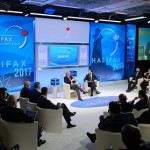This blog is based on discussions at the Halifax International Security Forum, held mid-November 2017. For more details on the event click here.
A year after Donald Trump’s win in the U.S. presidential election, the United States is debating and re-orienting its global engagement. This has sparked concern among the U.S.’ allies about American leadership of the trans-Atlantic alliance. This formed the backdrop of the ninth edition of the Halifax International Security Forum, held last week in Halifax, a windy, rain-soaked town in Canada’s Nova Scotia province.
Inaugurating the forum, Harjit Singh Sajjan, Canadian minister of national defence, and Jens Stoltenberg, secretary general of the North Atlantic Treaty Organization (NATO), spoke of the many ways in which Canada and the European powers were addressing emerging security threats. The Canadians favoured a greater international engagement, with a focus on the United Nations (UN) peacekeeping operations, along with an increased role for women in peacekeeping as part of Canada’s feminist foreign policy. Canada had hosted the UN Peacekeeping Defence Ministerial Conference in Vancouver only days prior to the gathering at Halifax where participants had pledged to prevent recruit and use of child soldiers in peacekeeping operations.
Secretary General Stoltenberg appreciated all that the European powers had done to increase their defence spending, but warned that the European Union could not replace NATO: any such attempt will jeopardise the trans-Atlantic alliance. Both leaders elaborated on these initiatives respectively, but stressed that the U.S. was still engaged and not about to give up its global leadership role or the leadership of the western alliance.
Subsequent parleys at the Forum picked up this thread – to focus on the enduring principles of the alliance and the current threats it faced. One of the panelists pointed out that while there was a perception of weakened American global engagement, there were some State Department officials working overtime to maintain the U.S.’ global profile at the same level as before. In similar vein, Ambassador Kay Hutchison, U.S. Permanent Representative to NATO, reassured the Europeans that European allies could count on the U.S.to offer protection.
Not everyone agreed. Discussing China’s Belt and Road Initiative (BRI), some panelists pointed out that while China’s investments in many Asian and European countries were transactional and a double-edged sword, it was the only country loaning money for infrastructure, while the West-backed financial institutions were floundering. As Financial Times commentator Edward Luce remarked, China’s BRI push clearly demonstrated that Xi had a plan and Trump did not. Many others noted that the BRI in Asia dominated western commentaries on strategic issues, but absent from them was any analysis of the corrosive Chinese influence in Europe.
Similarly, the tone of the discussions was decidedly anti-Russia for its actions in Ukraine and Syria – partially explained by the powerful Ukrainian Canadian diaspora. Speakers conceded that the West was tackling the threat that Russia poses in the 21st century with outdated means. Senator Jeanne Shaheen, who led the U.S. delegation at the Halifax Forum, minced no words when she said that there was a bipartisan consensus in the United States on confronting Russia, but President Trump’s words (read ‘tweets’) were creating unnecessary confusion.
China and Russia apart, technology – space, cyber, Artificial Intelligence (AI) and renewable energy – and its impact on international security, was an important area of discussion. Speakers agreed that the current state of great power politics made it difficult to have a set of norms for state behaviour in the cyber and space domains. There was an opportunity to listen to Dr. Eric Schmidt, executive chairman of Alphabet Inc. (the parent company of Google), who said that AI should be seen more as an enabler than a replacement for human beings: it will not do away with jobs, but replace ordinary tasks. In an important observation, he also said that when it came to pursuing the AI route, China had five times more willingness and capacity than the United States.
Discussions at the Halifax International Security Forum became intense, with panelists repeatedly urging the western policy makers to introspect on the future of the alliance. Historian Dr. Margaret MacMillan put it succinctly when she said that while the trans-Atlantic community was agreed on avoiding the repetition of events between 1930 and 1945 in Europe, it may have lost sight of that shared goal with the passage of time. Europe and Canada are stepping up their global engagement, but unless they also show a willingness to accommodate, and collaboration with, other competing power poles, the international security environment will remain in a state of tumult.
Sameer Patil is Fellow, National Security Studies and Director, Center for International Security, Gateway House.
This blog is based on discussions at the Halifax International Security Forum, held mid-November 2017. For more details on the event click here.
This blog was exclusively written for Gateway House: Indian Council on Global Relations. You can read more exclusive content here.
For interview requests with the author, or for permission to republish, please contact outreach@gatewayhouse.in.
© Copyright 2017 Gateway House: Indian Council on Global Relations. All rights reserved. Any unauthorized copying or reproduction is strictly prohibited.


